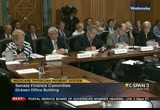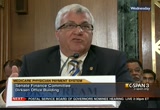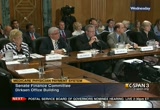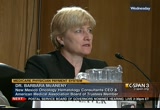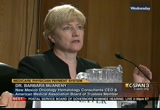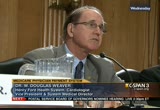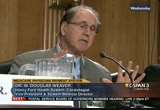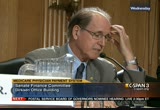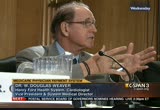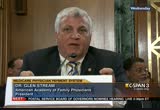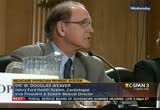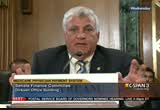tv [untitled] July 12, 2012 1:30pm-2:00pm EDT
1:30 pm
basis. i think as we start look for value within the system, it will be the physicians and those practices that are looking at the models of care that are being used. be they in primary care model medical home models, be they in bundled payments wherever they are, we're going to be looking constantly at the value of each of those delivery reform issues going forward. we have to be accountable as physicians for making sure that we're getting the job done as for the outcomes and the quality of the work that is being done. the new models that will be tested are being tested that are on the road right now being looked at are going to give us that information. because up to now we've not had that information. so it's very important going forward that we look at a variety of models that we recognize the importance of the practice environment be it a small practice, a large integrated group or what have you. it's going to be very important that we look at all of those and
1:31 pm
take into consideration -- >> what models are you talking about? >> we're talking about the primary care medical home model. glenn could speak to that as well. bundled payments, again, another model and frank could probably speak to that. these are out there in play right now as we are talking. >> whether in which of these models might bear fruit? which ones work? >> i would speak to the cpci the comprehensive primary care initiative currently recruiting practices through the innovation center in its goal and to align the payment methodology to support the patient centered medical home so the payment for support is continued fee for service. the care coordination fee that provides payment not in the fee for service system that has to do with coordinating care. the answer to your question is the shared savings component of that model it breaks down the silos and there's a potential for saved sharings from reducing
1:32 pm
hospitalizations, reducing er visits, reducing complications of chronic illness that result in expense like die yal sis. if you only look at the shared save information the medical home based on the physician services, there's too little skin many the game for the physician. but if the shared savings model looks across the silos then there's a win-win for the physicians making the effort that the medical home -- >> do you think there's potential? >> absolutely. it's a game changer. >> mr. chairman, isn't accountable care organizations isn't that to address this? that we put in the health care bill? >> partly. but at a more global level. that's at a system wide integrated delivery system. i'm talking really down at the level of supporting the primary care that's necessary for high functioning system whether it's in an acl or separate.
1:33 pm
>> mr. chairman, i think what both to have doctors were talking about is the independence of home model that we got in the affordable care act. you all and 3 oncologists are making the point that most of the medicare bill today goes for the chronically ill. that's where most of the medicare bill goes and through approaches like independence at home and we've seen those demonstration sites begin and i was very pleased that it was in the ama's testimony, we can take a much bigger population, number one, leave the patients in a position to be happier as oncologists noted and start tiering the payment system to reword those kind of efforts. i really appreciate what the ama has said. why don't we hear from the oncologists as well. >> thank you, senators. i do have the opportunity to prove a model with this innovation center grant which allows physicians to control those things that we really can
1:34 pm
take control over. there are a lot of parts of health care, the cost of drugs that we have no ability to manage. but we can manage the site of service and we all know it is a lot less expensive to treat people in our offices than it is in emergency departments and hospitals. and in this grant that we wrote, we used data. i agree that data is key from our own practice showing how much money we could save medicare in one small practice in new mexico by keeping people in the office, aggressively managing the disease and the side effects of treatments so we keep people out of the hospital. we keep them healthier. and we keep them out of emergency departments and we can use less imaging. those are the things that doctors can control. and so with six other practices across the country, we're going to demonstrate that if we create ourselves as an oncology medical home that we're ready to accept a bundled payment, give us a
1:35 pm
payment that will allow us to take care of these patients. it will cost more in the outpatient arena, but the savings are far made up for on the inpatient setting when we keep people healthier. we think we can generate true savings in that manner. and better care. >> mr. chairman? i'm wondering, dr. weaver could you talk a little bit about, harry ford is one of the eight multipayer primary care. >> i wanted to give a couple of examples where we might have savings. and that is one of the things that cms is starting to do, which i must applaud is paying for some care management. that means supporting the infrastructure which may be nurses, medical assistants, part time pharmacists. really not doctor stuff. this is stuff that keeps people on the right -- on their right care plan as well as keeps them out of the hospital.
1:36 pm
in michigan, the blues along with cms and all of the payers have rewarded the physicians in primary care an extra $7 to $9 per member per month to do care management. they must meet certain quality standards. certain utilization standards to qualify. the state itself this year because of this project thinks that the dual eligible expenses to the state will drop $38 million. so that up front investment to give more management has helped. i'll give another example. the blues in michigan fund cardiac data registries. the only thing that they say is that you must submit your data and you must meet quarterly to discuss the data among all of your hospitals. it's led to huge reductions in complications and improvements.
1:37 pm
they did the same thing for bare ya trick surgery. they got together. they made a database. they got the data back and complications from bare yat rick surgery have dropped 30% and readministrations for patients that had the surgery have dropped 35%. so i point out that care management as well as, i tell you again, doctors are data driven. if you give them the infrastructure so they have clinical data that they believe is credible they will respond in ways to improve the call of the patients. they all want to provide the best quality of care. >> just as a follow up and maybe for anyone we have this quality reporting initiative that we set up under medicare we only have about 1/3 of the physicians right now who are actually using it in 2015 it goes from an incentive to a penalty.
1:38 pm
what are the barriers. why aren't more doing it? >> let me respond to that. that is my feeling, cms is promoting a lot more transparency with data. but the measures reported, readmission rates, smoking cessation and these things, they're very, very crude measures. and they don't really accurately tell you whether you have a good doctor or a great doctor or someone that's not so good. >> what's in the report. >> >> i think that they want as others have suggested they want to report the things that they think is important and have developed within their specialty to say these are the problems. here's how we measure them. give us the data back as a benchmark and they will improve. >> if i may respond to that because oncology for years before this came up developed a call oncology practice initiative which was a bunch of oncologists sitting around. what can we do, what can we measure to improve what we do? this costs money for our
1:39 pm
practices to participate in. but thousands of oncologists have participated willingly spending that money to do a better job. because we can craft measures that really are pertinent to what we do every day, and when we complete one measure, then we can say okay everybody's got that. let's move on to the next thing. let's do the next step. and each of the specialties can do that to create their own quality system instead of having a broad brush generic measure. >> as well as more flexible. i'm sure all of you have heard about the time to treatment and people with heart attack. the college of cardiology put together a program many years ago and people moved from hitting at the 50% to get it in that right time period to essentially everywhere. you want to move on after that. you've got that one done. and you can't regulate that. you've got to allow the specialty to see where the voids
1:40 pm
right now and insent physicians to participate and make sure there's infrastructure in order to collect this kind of credible clinical data and you will have a much more reactive and fast turn around in improving quality. >> one of the things we try to put in that affordable care act was a focus on the reporting about outcomes. seems to me that, you know, a sort of underlying or overarching data set that should sort of span all of the various specialties would be -- how do we get accurate reporting on outcomes for patients? is that realistic? is there a way for someone to -- for cms, government or anybody else to say, okay, here's what we want reported on that relates
1:41 pm
to how well people are doing after they get this treatment? >> if i could, thank you very much for that question. the college of surgeons registry programs are risk adjusted outcomes reporting. it's very effective. so for example, in the field of general surgery in vascular surgery and over 500 hospitals we collect roughly 100 to 130 data elements over 30 days on a patient's care. that data then churns out into a risk adjusted expected outcome and we measure the actual outcome against the expected. that's very meaningful to the delivery system. and these are team based care systems. it's not just is surgeon. it's the nurses, it's pharmacy, it's everybody there. it's primary care. it's linking to my colleague here. i don't have good surgical outcomes unless i've got a good patient to begin with. i can more than and see what are
1:42 pm
the drivers for better care. we've actually been working with cms who really i applaud their efforts in performance measurement. we had to start somewhere. we started with measures that were less than perfect. but it's moved us all. where data -- data is a drug. and we're adetectived to it. we can't get enough data. we want meaningful actionable data. so we've parts nered with cms and started to show them how the current data sets they have don't get them the answer they want and we're showing them more meaningful data sets. and where we need help is how do we actually expand this infrastructure beyond 500 hospitals and 4,000 hospitals. how do we ling this beyond surgery into surgery in primary care across the patient continue yum. it isn't about how well i took out someone's colon cancer out. it's more about how the 18 months of critical cancer care drove the best outcome for that
1:43 pm
quality. we're closer today than we ever were. there's a lot of things we need to do. some infrastructure components to build upon and build the business models into it everyone is aligned. we're very excited about going forward and we actually are looking forward to taking that next step. >> just like i don't think there's a single payment solution across all specialties because there's unique differences in the question about quality, the issue for primary care is fb often about treatment for chronic illness. the pay back time to have good outcomes might be five, ten, 15 years. my good diabetic management of my patient today is to avoid them being on dial sis ten years from now. instead these quality measures use approximaty short-term measures. what's your blood sugar control, your feet checked, eye kpams? we use approximaty measures that aren't outcome measures because the time line is too long.
1:44 pm
then you get into a debate are the approximaty measures the right measures. to the point about developing good measures. we want to make sure that those are valid measures that reflect reality. they're the things we should be measuring and working to improve to get those eventual outcomes. >> go ahead. >> that's all right. >> i don't know that your microphone is on. >> is that better? great. the light doesn't reflect. i was bringing, you were talking about obviously call and outcomes and one of the things in the affordable care act is moving to this value based system. when you look at what some of
1:45 pm
the estimates are on medicare wastes $120 billion per year due to unnecessary tests and procedures. so won't -- i mean, haven't we proven that we can deliver better care at lower cost and now it's just about figuring out how to implement that system so that people are as you were saying incentivized to do the right thing as opposed to -- >> i can jump in on this if i might. this is a good first step. i think clearly, you know, the concepts are in there. what we've got to now do is look at the methodology. be sure that the methodology is appropriate for what we want to get accomplished and it gets us to a good place. i do think it is a good first step. we're in the process of reviewing all that. it just came out in the new rule. we will be getting back to you all on that. i do believe it is a good first step. >> met me take a couple of comments that is about the value based.
1:46 pm
i personally am very worried about the way it is structured. it plans to use pkrs measures. some prevention measures as well as look at cost that is regional. and i have to tell you that what people have said today is you need meaningful, credible, data in order to do any adjustment for what the outcome or what the cost should be. i lived in seattle. when i moved to detroit, if i look at patients i had never seen a population like this before. they would never get adjusted for adequately with administrative data. you've got a population in which 25% of people graduate from high school. they're working just to stay alive. you have people that have burned off their kidneys with long standing hypertension when they're age 30. i never saw that in seattle. they both have heart failure, but they are very different
1:47 pm
kinds of people. and so taking crude measures to try to adjust severity and adjust payments would be a huge mistake in my mind. and so the value, if you will of some of these specialty things is that people literally spend many, many hours trying to figure out what is going to be legitimate here when you do risk adjustment and what is not. they are the experts. they understand the disease. and you have to be very careful. the thing, the other thing that the cardiologists have been using is appropriate use criteria. what these are are a panel gets together including a panel of payers and physicians and other experts and they welcome at a lot of conditions for which we really don't have solid guidelines for. it's just science isn't there. they say this seems to be reasonable knowing what we know. this is not so reasonable.
1:48 pm
a year ago, we started providing feed brack to the hospitals on the use of stenting. and there were a good portion of cases in which there were concerned to be unnecessary. or inappropriate. now we never expect that number to be zero because there are individual differences and so on. you ought to be pretty close to what the national benchmarks are for these numbers. so we have seen since we started producing this a decline in that number. and in fact, if you look there's been a decline in stenting procedures the last year or two years in the u.s. and it's predicted to go further. so providing credible data, giving it back to those docs will change the way in which they behave. >> i certainly believe in credible data. i don't know if youfd want to weigh in on this.
1:49 pm
i mean, when i think of spokane, i think it's a great place. and i certainly think that the population with the city title of nature near perfect is a good symbolism. i don't know if we're talk about healthier populations or healthier practices. i think we have healthier practices in the northwest rewarding things that have driven down cost and produce better outcomes. and frankly people in our region are very frustrated that we deliver care that way and get less reimbursement and less people that want to go practice there and somebody can go practice somewhere elsewhere they can run up the bill to the american taxpayer. my constituents they'll be happy with good data tonight a assume they're healthier and some place else is sicker and pay more is not going to work. i'm glad we're moving down the track i guess we're going to have to focus on what good data
1:50 pm
is. if you have any comment on that, dr. stream, and also on what we need to do to encourage graduate medical education if we're looking at the numbers that we're looking at to get medical homes and primary care we have a big gap right now in encouraging primary care physicians and what do we need need to do for graduate medical education to really get that workforce plugged in. >> so, several questions and certainly, we need good data about all these things and good care practices and populations do differ and inner city populations with more poverty and less education and the social determineants of health and we need good data about both, so that if we're making risk adjustments, that they're true and accurate. i can speak to value-based purchasing that it's not necessarily a program, but as a concept that provides to primary care and we have to build a stronger primary care foundation if we'll have success in proving
1:51 pm
the quality and cost effectiveness of the healthcare system and that really is the blended payment model that supports the medical home model, decreasing over time in the importance of a fee for service and having a meaningful care management fee and prevention and wellness and then the piece that gets to your question is that shared savings piece or if it's pay for performance can include both quality measures and appropriate use, efficiency and that would be the third leg of the stool about payment to support primary care, but you're also right and i appreciate you're right about the workforce issue, and i would emphasize that decisions made that influence specialty payment have a huge influence on specialty selection of our medical students and currently a strong disincentive for people to choose primary care and you have to narrow the income gap between
1:52 pm
median and sub-specialty impact. >> and just from what everybody's been talking about, do we have the workforce now to implement the strategy that weir talking about. >> absolutely not. >> so, thank you. >> if i can follow up on that, senator. the whole issue of medical school education, graduate medical education, we, at the ama have been looking at this critically, and this is a problem which preceded current issues surrounding payment and delivery. this isn't new, changing the curriculum in medical schools and making sure that primary care is being taught and rendered in places not necessarily traditional for primary care education that we're opening and expanding the venues in which you can do the education and all of these things are on the table as we talk about it and it takes seven to ten years to grow a doctor and we've got to get those slots filled out and we've got to have more funding towards that as
1:53 pm
well and it's one of the imparities that's part of the whole discussion. >> thank you. >> mr. chairman, thank you very much. >> when i first started law school, one of the things that was impressed upon me was the difference between a profession and a business and it was all about the individual client. you had to give your absolute commitment to your client whether the client can pay or not and regardless of your idiosyncracies and i began to practice and found out it was true in spades of the medical profession. data is collected to provide information about averages, but every patient is an individual and i know that all of you are committed to treating every one of your patients as an individual. the rub comes when you're treating patients that are paid for by the united states government under a set formula of one kind or another and my
1:54 pm
question to you is in devising, we recognize that the formulas, the pay scales, however they're going to become embedded in a replacement for sgr would need to be developed by the professions themselves and take into account individualized circumstances including regional circumstances in the country, but my question is is sufficient attention being given to the requirement that the care really be patient centered? when the patient walks in the door i have one obligation and one obligation only, to take care of that patient to the best of my professional ability. at the end of the did i i've got to get paid, but not to have the payment drive the care and then
1:55 pm
a second sort of related question that when we deal with this because of our unique budget requirements here in the congress we have to set a ten-year plan out. and it's very hard for us to know whether the eighth, the ninth and tenth year are going to work with what you're recommending for us in year one, two and three and so on and just for our own purpose, and i wonder if you have any suggestions for us and if you want to think about this and get the information to the chairman later, how we would devise something that we think will work over a shorter period of time, but we really don't know over a longer period of time. that was one of the problems with sgr to begin with. thank you. >> anybody? >> mr. chairman, thank you. senator kyl, thank you for the question. two responses to this in my mind, where we've begun with performance measurement and
1:56 pm
valuing circumstances is still in the silos of care and it's still in the various different performance programs and not as patient centric as it could be and as we start to spread performance measurement across acos and we look at population-based performance and how long we're taking care in the continuum and we start sharing the attribution, it becomes more patient centric. so where we were three or four years ago when we started really pushing hard on physician performance measurement was just at the beginning and how do we begin to measure individual physicians and reward them in the hospital and reward them. we've grown over the last couple of years to start to understand some of the points made by my colleagues at this table and from the input of all stake holders and from the patients and who are helping us look at this and say this is a better measure because it really is more meaningful to the patient,
1:57 pm
and as we move to that, it doesn't necessarily fit within the payment structures and silos of payment and we have to make the second point and that is we've never proposed replacing the sgr which says let's pick a target. we want to improve cardiac care this way and it's not just the cardiologist and it's the cardiac surgeons and anesthesia and everyone who touches that patient will be incentives that that's the target they want to get to and let's drive to that target, so i think we're becoming more patient centered and we keep replacing an sgr and does it get to eight to ten years? i hope so, but it may take us eight to ten years to even get to that point. will it be something else 12 years from now?
1:58 pm
we're always evolving this so i'm not going to say this is forever. that's a fascinating question. would anyone like to respond to that? >> i agree completely when a physician is in an examination room with a patient their best examination should be the highest priority, making sure that that patient gets the treatment that they need that will improve their health and improve their quality of life, but what we're finding and it goes to senator cantwell's comment that we know the system that currently provides care, and my ability as someone's physician is to make sure they get the care that they need and they don't get care that doesn't enhance their health and that's where i think, it doesn't give an easy solution to the sgr problem, but it is the potential for cost savings to eliminate care that does not contribute to people's health and that's an
1:59 pm
area that dr. weevor was mentioning stenting data and the power of that information as physicians is they want to get a-plus and they're scorers and when comparing to one another that's another aspect of professionalism and we need that going forward. >> doctor? >> thank you, senator. senator kyl, i think one of the answers to your question about why is the care not as patient centric as it could be is in the silos of payment that we pay by area of the country so that areas such as the area in the west and new mexico and arizona have lower payment rates for the same service. there's differentials in the side of service, the same service in a different setting, a hospital, physician offices pay far differently. if we had the payment and more follow the
137 Views
IN COLLECTIONS
CSPAN3 Television Archive
Television Archive  Television Archive News Search Service
Television Archive News Search Service 
Uploaded by TV Archive on

 Live Music Archive
Live Music Archive Librivox Free Audio
Librivox Free Audio Metropolitan Museum
Metropolitan Museum Cleveland Museum of Art
Cleveland Museum of Art Internet Arcade
Internet Arcade Console Living Room
Console Living Room Books to Borrow
Books to Borrow Open Library
Open Library TV News
TV News Understanding 9/11
Understanding 9/11